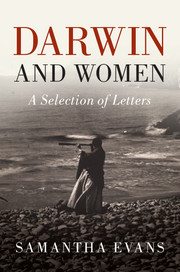Book contents
- Frontmatter
- Contents
- List of illustrations
- Foreword
- Preface
- Acknowledgments
- Symbols, abbreviations, and conventions
- 1 Friends
- 2 Marriage
- 3 Children
- 4 Scientific wives and allies
- 5 Observing plants
- 6 Companion animals
- 7 Insects and angels
- 8 Observing humans
- 9 Editors
- 10 Writers and critics
- 11 Religion
- 12 Travellers
- 13 Servants and governesses
- 14 Ascent of woman
- List of letters and provenances
- Biographical notes
- Bibliography and further reading
- Index
6 - Companion animals
Published online by Cambridge University Press: 16 February 2017
- Frontmatter
- Contents
- List of illustrations
- Foreword
- Preface
- Acknowledgments
- Symbols, abbreviations, and conventions
- 1 Friends
- 2 Marriage
- 3 Children
- 4 Scientific wives and allies
- 5 Observing plants
- 6 Companion animals
- 7 Insects and angels
- 8 Observing humans
- 9 Editors
- 10 Writers and critics
- 11 Religion
- 12 Travellers
- 13 Servants and governesses
- 14 Ascent of woman
- List of letters and provenances
- Biographical notes
- Bibliography and further reading
- Index
Summary
Women were less active in the field of zoology they were in botany. Many of the observations Darwin was sent were from amateur observers, rather than from people who had made a special study of the subject. Most people in the Victorian period lived closely with animals; horses were used for transport, and dogs and cats might be pampered pets or semi-independent household companions; even an invalid might have a bird for entertainment. Darwin's comments on animal behaviour, in Variation under domestication, Descent of man, and Expression of the emotions, attracted much interest. The analogies Darwin drew between human and animal behaviour struck a chord with many; and women in particular drew conclusions about human treatment of animals. Where Darwin's female correspondents made formal studies of animals, they were on insects, barnacles, and earthworms. The correspondence on animals has therefore being divided into two chapters: Companion animals and Insects and angels, ‘insect’ being the popular term for any small, apparently insignificant, creature. (No reflection is made on the actual companionableness of insects—John Lubbock had a pet wasp— or on the usefulness of companion animals; the distinction, which is admittedly loose, points only to a difference of approach.)
The following account of learned behaviour in a dog came from Jane Loring Gray, the wife of Darwin's Harvard correspondent, Asa Gray:
Botanic Garden, Cambridge
Feb. 14— ‘70’
My dear Mr. Darwin,
Dr. Gray says, “You write & tell about the dog!”— And indeed it was only a supposition of mine that he was suckled by a cat, from his queer tricks when he came to us, a young dog of about 7 months old— He then would chase his own tail for sport; but I have heard of other dogs doing that— But he still keeps up the trick of washing his face with his paws, & will sit as demurely as any old tabby, licking one paw & rubbing his face, & then changing to the other— I am glad if he has any tricks worth noticing, for he is a stupid little doggie at learning anything new, & has nothing but an affectionate heart & some beauty to recommend him—
- Type
- Chapter
- Information
- Darwin and WomenA Selection of Letters, pp. 90 - 104Publisher: Cambridge University PressPrint publication year: 2017



